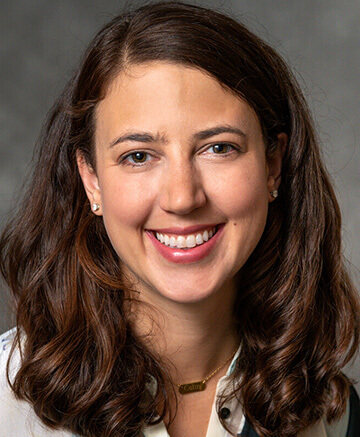June 18, 2021:
 Amanda Parkes, MD, a medical oncologist specializing in sarcoma and breast cancer at the University of Wisconsin Carbone Cancer Center, has been named co-chair of the Big Ten Cancer Research Consortium’s Adolescent and Young Adult (AYA) Clinical Trial Working Group and the Sarcoma Clinical Trial Working Group.
Amanda Parkes, MD, a medical oncologist specializing in sarcoma and breast cancer at the University of Wisconsin Carbone Cancer Center, has been named co-chair of the Big Ten Cancer Research Consortium’s Adolescent and Young Adult (AYA) Clinical Trial Working Group and the Sarcoma Clinical Trial Working Group.
Dr. Parkes, an assistant professor at University of Wisconsin School of Medicine and Public Health, has been a member of the consortium’s Breast Cancer Clinical Trial Working Group and the Sarcoma Clinical Trial Working Group since 2018. She has also participated as an investigator in several Big Ten CRC breast cancer trials and is leading the new breast cancer study, BTCRC-BRE19-409, which is currently enrolling subjects at the UW Carbone Cancer Center and will soon open at the University of Illinois Cancer Center in Chicago.
Her involvement with the AYA Clinical Trial Working Group (CTWG) is just beginning, as this group is new to the Big Ten CRC. She is co-chairing the AYA group with David Dickens, MD, of the University of Iowa Holden Comprehensive Cancer Center.
According to the National Cancer Institute, about 89,000 AYAs ages 15 to 39 are diagnosed with cancer annually in the United States accounting for eight times the number of cancers diagnosed in children ages 14 and under.
Dr. Parkes said it is important to take this age group into account when developing clinical trials.
“I want to make sure we’re supporting these young people appropriately, that they’re getting the same quality of care as we would give younger or older patients and that they have the same access to clinical trials,” Dr. Parkes said. “These are all things that we’ve seen in our AYA research that are barriers for adolescents and young adults.”
She has found AYA patients have similar goals as older patients; however, younger patients are often more concerned about long-term toxicities with treatment. She sees the AYA CTWG as a resource to help ensure that these and other considerations for younger patients are discussed early in the protocol development process.
“I think any trials that are being developed within the Big Ten CRC should have the AYA Clinical Trial Working Group take a look at the protocol, to ensure that inclusion criteria are appropriate for AYA patients,” Dr. Parkes said.
In addition to her work on breast cancer studies and the AYA CTWG, Dr. Parkes also serves a co-chair of the Big Ten CRC’s Sarcoma CTWG, along with fellow co-chair and UW colleague Zachary Morris, MD, PhD.
“Researchers in the sarcoma group are all dedicated to improving the health of our patients,” Dr. Parkes said. “We have the opportunity to work with the Big Ten CRC administrative headquarters to ensure that we have considered all of the ways in which to support the ideas that come out of this working group.”
Dr. Parkes said she anticipates leveraging multi-disciplinary collaboration within the Big Ten CRC to support trial development, correlative research, and access to treatment.
“One of the things that we as a group can continue to do is harness the power of the correlatives working group,” Dr. Parkes said. “I was fortunate to present my breast cancer trial to the Correlative Sciences CTWG, and the ability to collaborate with bench scientists in an inter-institutional way is something we probably don’t utilize enough anywhere.”
She hopes this multi-disciplinary approach will enhance consortium studies and ultimately lead to better outcomes for patients.
“It is really exciting to hear the ideas investigators have and to participate in the concepts that are being developed,” Dr. Parkes said. “The Big Ten CRC is a great group of clinicians and researchers who are all dedicated to the same goal.”
About the Big Ten Cancer Research Consortium: The Big Ten Cancer Research Consortium was created in 2013 to transform the conduct of cancer research through collaborative, hypothesis-driven, highly translational oncology trials that leverage the scientific and clinical expertise of Big Ten universities. The goal of the Big Ten Cancer Research Consortium is to create a unique team-research culture to drive science rapidly from ideas to new approaches to cancer treatment. Within this innovative environment, today’s research leaders collaborate with and mentor the research leaders of tomorrow with the unified goal of improving the lives of all patients with cancer.
About the Big Ten Conference: The Big Ten Conference is an association of world-class universities whose member institutions share a common mission of research, graduate, professional and undergraduate teaching and public service. Founded in 1896, the Big Ten has sustained a comprehensive set of shared practices and policies that enforce the priority of academics in the lives of students competing in intercollegiate athletics and emphasize the values of integrity, fairness and competitiveness. The broad-based programs of the 14 Big Ten institutions will provide over $200 million in direct financial support to more than 9,800 students for more than 11,000 participation opportunities on 350 teams in 42 different sports. The Big Ten sponsors 28 official conference sports, 14 for men and 14 for women, including the addition of men’s ice hockey and men’s and women’s lacrosse since 2013. For more information, visit www.bigten.org.
















Subscribe to the Big Ten CRC Newsletter X
X Facebook
Facebook YouTube
YouTube